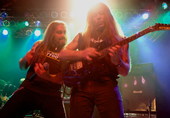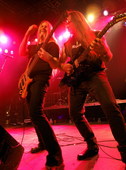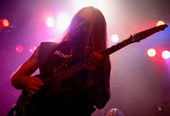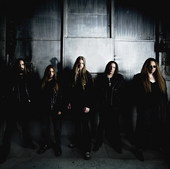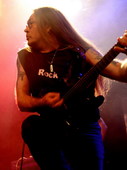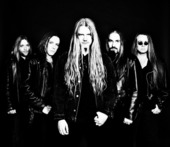Tarot
06.02.2009
Архив интервью | Русская версияInterviews are unpredictable – some turn out so easy that you can’t even believe it, and some take so much time and efforts that you’re just wasted when the work on them is over. This one belongs to the latter category, because everything about it seemed to be going wrong. Our phone conversation with Marco Hietala, bass player of Nightwish and leader of veteran Finnish metallers Tarot, had to be rescheduled three times to make it happen. Moreover, the line was so bad that I could hardly understand anything from the recording. As a result, it took us half a year to eventually put it online, for which we, of course, apologize to all the parties involved. Luckily, not much has changed around Tarot over this period – their DVD “Undead Indeed”, to which the interview was timed, still remains their latest release, and previous events in the band are still relevant, because, despite playing excellent music for about 25 years, Tarot are still TRAGICALLY underrated. The Nightwish gig in Moscow, which was upcoming back then, never took place, but OK, maybe next time. Work on this interview showed us once again that sometimes you have to wait a while to get good things coming your way…
Our main topic tonight is Tarot’s new DVD and CD “Undead Indeed”. The show that we can see on the DVD – is it a regular show or some special event? Why did you choose this particular venue (Club Rupla in Kuopio) to record it?
The venue was chosen because this was the place where me and my brother Zak as teenagers first played 25 years ago. We had a different drummer and a different guitar player, but in the end this band became Tarot. So it’s a historic place for us, and that’s why we chose it. Also it has a good size for a band like ours, we are mainly doing clubs, not bigger venues, but in clubs you can have a full house, especially when you’re playing in your home town.
The show wasn’t that much different from what we had been doing for already about a year before, the period that we had been touring before the show. We just added some songs and played a slightly longer show, in order to get as much footage as possible for the DVD.
You already had a live album in 1994 (“To Live Again”), but it’s the first time you are doing a live DVD. What were the main difficulties that you faced while making it? And how much were the band members involved in post-production, editing, etc.?
The main difficulties were probably at the responsibility of Mr. Tuomo Leskinen, who is the executive producer of the whole thing. He put together the technical stuff to get the whole thing happening, and he’s the one who was suggesting the DVD to us. He said – if he can get the house, if he can get the people, if he can get the cameras, would we be willing to do a slightly longer show for the DVD. Of course, we said “yes”. I can see that he got into a lot of trouble to get the whole thing done. Afterwards the editing process was done by the director, Mr. Harri Mielonen, and the mixing and almost all the mastering was done by Janne, our keyboard player, and Mr. Mikko Tegelman, who has been doing the mastering for us for quite a long time. Our job was mostly to do what we can do best – playing.
The cover artwork of “Undead Indeed” is very impressive. Who was responsible for painting the cover?
The front painting was done by the man called Janne Pitkanen, he has a website under the name of Toxic Angel. He’s been doing quite a lot of stuff for Finnish bands in the last years. He also happens to be a fan of the band for many years. I think the first cover he did for us was on the “Suffer Our Pleasures” album (2003).
Both the covers and the music on the last two of your CDs are getting darker and darker. At the same time, you have said in several interviews that it’s not intentional. In this case, what are the factors that influence your music and lyrics? When you write down such dark and angry songs as “Messenger Of Gods” or “You”, there must be a reason for it….
Yes, of course, there is. “Messenger Of Gods”, if you read between the lines, is full of symbols that can actually be interpreted quite easily. It pretty much deals with the world that we’re living in today. There is a war in some place on the globe every day. There are quite a lot machines watching you, and you never know who’s really behind everything. You may be targeted by the corporations to buy their stuff and all this kind of shit. It makes you think what kind of value an individual has any longer. So this is why something like “Messenger Of Gods came to be. “You” is a lyric I actually wrote already a while ago, so it’s not that new, though the music was written in the year when it was released. To be honest, I’m not sure why we are going more and more into this darker and angrier direction, it’s may be because we’re more willing to use it these days. The influences are the music that we listen to and the things that we do, and it’s pretty much easier to do angrier stuff these days than in the past. I don’t know why, but it just works this way. It’s just a side of our personalities that we would like to explore and to dive into right now. Basically we’re pretty humorous bastards anyway, I don’t want to sound like we live with this dark mood or anything like that.
What was the band’s reaction when the single “You” topped the Finnish charts? Did you expect it or not? And did this success change anything in the band’s life?
(pause) I think we were booked to do more shows. (laughs) Not much has changed in our lives. It was a privilege for us to get a single on No. 1 of the charts, and of course, we were pleased. We were doing a show in Tampere, Finland, on the night we heard the news, and it was a good excuse to have a good party afterwards.
Will it be correct to say that your contract with Nuclear Blast helped you reach a much bigger audience than before?
I think it will be fair to say that it did. It gave us the opportunity to have a couple of small tours in Germany, to do a show in Romania and so on, and to sell albums via a company that knows how to sell heavy metal. That is, of course, a very good thing for us to happen.
I have looked at your touring schedule, and most of the concerts Tarot played after the release of “Crows Fly Black” (2007) were in Finland and Germany. What about other countries? Aren’t there any promoters interested in bringing Tarot over to their lands?
There are some places which we consider. We tried to play in Spain last summer (laughs), but the promoter wasn’t up to his job. He screwed up the timetable so we had to leave in order to catch our flights before we could even play. People have been asking us to play in different places, for instance, this summer there have been quite a few offers, but the thing is that they came a bit too late, because we’re already starting to tour with Nightwish, and I really can’t cancel that.
Every now and again Tarot takes a break for several years – you did a couple of albums in the 1980s, and then you took a break, then a few more in the 1990s, and then once again a long break. What are the reasons? Is there any strategy behind this?
It’s not really a strategy, it’s just how life turns out to be. The first break was between 1988 and 1993, and that happened because we got fired from our record company at that time. In the 1980s we were getting into a heavier and aggressive side of things, and they thought that the time of heavier music would be over. They asked us if we would be willing to do something like Europe, and we categorically said “no”. We ended up being fired from the company, and then it turned out that the time of really heavy music wasn’t over at all, things get harder and heavier all the time. I guess we were somewhere in between, because companies here in Finland were signing either bands like Europe or newborn thrash metal bands, and we were into a traditional British way, and nobody really wanted us. Wee just demoed some stuff, and then I started some studio engineering, and things went like that until finally we had a full album worth of material and then we got a chance to release it through Bluelight Records in 1993. That ended the first break, and we did a couple of more albums. Then there was this time when I went away from my former hometown, while the rest of the guys were still living there, so rehearsing was pretty hard. I was living in Helsinki, I got to do a couple of tours with the band Sinergy, and there was really no time and no energy to do the stuff with Tarot at that point of time. It only came together later on, when we all felt that we have the songs which we would like to use for Tarot. We came together in – when was it? 2001 or 2002 – and it was a new starting point. In five days we already had demoed the most half of the album, and some songs were already in the works. It just kind of happened that in 2001 or 2002 we decided that we were going to do an album.
Despite all these long breaks, you have had nearly no line-up changes. What is your secret of staying together that long?
We’ve been through quite a lot of hard times together with these guys. And if everybody wants to play our thing it’s best to stay together and do it that way. Of course, if somebody wants to leave and do something else or retire, that will be a different thing. Of course, there have been some fights and some people quarreled with each other during all these years, but we’ve always talked over those things and ended up staying together. One of the main strengths of the whole thing is to have these particular people. We know each other pretty well, and we know how each other plays, sometimes it’s almost telepathic.
Tommi Salmela has been singing with you for a long time, but only recently he became the fifth bandmember. Why did you decide to do that, and what is his role in the band at the moment?
He could have been an official member already at the time of “Suffer Our Pleasures”, but we just stupidly overlooked the whole thing. As you said, he’s been a part of the live line-up for a long time, he’s been doing samples and singing backgrounds and occasional leads, but when we started doing “Suffer Our Pleasures”, we just went there full speed ahead – we finished songs, we recorded them, then we got a contract from Spinefarm Records, then we released the album, and only afterwards we found out that Tommi actually sang on the album quite a lot more. Now that we started writing songs like that, I already had ideas for more songs, for instance, “Bleeding Dust”, where we split everything – the verses and the choruses. And then we found out that when you think about songs in this way, you get more versatility, you can build different contrasts, use different voices and stuff. At this point we all agreed that Tommi was definitely gonna be part of the official line-up. I suppose he’d probably been waiting for it for some time, so we had to say, “Sorry about that, we should have realized this earlier.”
How do you manage to combine Nightwish and Tarot, especially that Nightwish is such a heavily touring band? How do you solve the conflict of interests?
Of course, it’s hard, I need to schedule things pretty much. But there are a couple of things that help me, for instance, one thing is that we have the same management for both bands. That helps me to book the tours and know the timetables. Whenever Nightwish tours, I go out, and when we are taking a few months off, I go to the studio with Tarot guys and play shows with them. At the same time, when I have time off from those shows, we will probably be entering a studio with Nightwish. Then I have some time for myself until the new Nightwish album is released, so it’s pretty much the same schedule. We’ve done this for a couple of times, we know how it works. But of course, it we had different booking agencies or different managements, there would probably be something bad, it would make it impossible.
Do you ever have any time off, any vacation, or do you spend all you time playing music?
Well, not all the time. I do have some time off, but really I might be called a workaholic. I don’t mind to use my voice, and I like to play the bass, so I do things that I find worthwhile. For instance, I produced vocals for two of the latest albums of Amorphis, and it was something which I really liked to do, because I really like the band, I like how Tony Joutsen sings, and they’re relaxed kind of guys, so it’s a good situation. I do like to do these kind of things, but then again, they have to be worthwhile to me. I’m not gonna go to the studio with just some band who pays me enough, I gotta be interested in the music, the people and all that.
Going back to the issue of vacation, I do have it sometimes, obviously you need one after a tour. When the Nightwish tour wraps up, I’ll probably be taking some months off. The same thing happened last time when we played a tour with Tarot – we did this DVD, after that I had one or two months without anything to play until the new Nightwish tour started.
You write some of the songs for Nightwish and you are also a songwriter for Tarot. How do you divide the material? Do you know from the beginning that some song will not work for Tarot, but will work for Nightwish, or do you let Tuomas (Holopainen, Nightwish main composer) choose among your ideas?
Most of the time I do know which kind of stuff fits better to one or the other band. I usually know that pretty much when I demo or try out some songs, and I can say that this song is better for Tarot and that one for Nightwish. But occasionally there are situations when I just give demos to the guys and let them decide if they like it or not. Occasionally they just get close, but usually there are some differences which make it pretty clear. Tarot is much more guitar-oriented than Nightwish, and I compose a lot of stuff with the guitar which later finds its way into Tarot.
The song “The Islander” suggests that you might be interested in making an acoustic album. Is that indeed the case?
Well, I do play a lot of acoustics at home, I’ve been playing it for all the long years. I started with an acoustic guitar, and I only switched to bass when we started our first pre-Tarot band. I played classical acoustics when I was at school, so I do like to fiddle around with that thing. I have a soft spot for it, and I do miss playing old Tarot stuff which has a lot of acoustic guitars, mandolins and stuff like that. I write a lot of stuff with it. There have been songs which came out on various albums, and there are quite a few songs which have yet to see the daylight, but I hope they some day will.
In general, if you ever decide to do a solo album, what kind of music will you play?
I will probably try to build up a contrast between playing quite a lot of machinery style drums, a lot of distorted and loud bass and a flood of acoustic guitar, and then you just figure out what kind of music that would make, I don’t know. (laughs)
You are playing and recording a lot of covers with both Nightwish and Tarot. How do you choose cover songs to perform? For instance, what motivated you to do “Veteran Of The Psychic Wars” by Blue Oyster Cult? Many people don’t know the song at all…
That’s true, they don’t, and that’s probably one of the reasons why we chose to do it with Tarot. It would be quite silly if we take a really clichéd experience to go on and record “Smoke On The Water”. So we tried to find something that we really like – in all bands, not only in Tarot. We tried to find some songs that everybody likes, and tried to go on from there to something that would really sound like the band who’s playing it right now. Of course, we’ve not always succeeded in that, I don’t think, for instance, it was a good idea to play Ozzy Osbourne’s “Crazy Train” with Nightwish. But the Pink Floyd cover, “High Hopes” – I don’t think it was something that people were expecting, and I was pleased to do that. The same thing is with Tarot doing “Veteran Of The Psychic Wars” – it’s a song that all the guys like. When we listened to Blue Oyster Cult, we always saw that this song had a really good atmosphere. Our goal when we’re doing a cover is to find some aspects that you can make your own. We built it up pretty much like the original arrangement, but added more guitars and bass in order to make it heavier and gloomier. And we managed to do it. Then again, Tommy’s voice many times reminded me of Eric Bloom’s vocals, so it was a perfect song for him as well.
Speaking about choices – when picking up the new singer for Nightwish, what factors did you take into account? It’s clear that you didn’t want another Tarja Turunen or another opera style singer, but what else was behind the decision?
We didn’t put any restrictions when we started auditioning the singers. I said that we will hear all the comers - we will listen to classical singers, we will listen to pop singers, we will listen to rock singers, folk singers, whatever. The only thing that we wanted to find was somebody who would have a personality. And then we also wanted to find somebody who would have the vocal range to do the stuff that we do, because it’s very demanding, and also be able to pull out pretty good highlights on the back catalogue as well. We listened to a lot of candidates, and Anette, it was pretty clear that she was among the best already in the beginning. She was among the first ones who sent us their demos, and in the end we liked her most.
In the period when you were auditioning the singers, there were a lot of rumors about who would be the next vocalist in Nightwish. Some suggested it would be Liv Kristine (Leaves Eyes, ex-Theatre Of Tragedy), others named Simone Simons from Epica. Do you have any idea where these rumors were coming from?
People were just speculating. These days when you can get to media and talk in the Internet about everything, people just throw in a speculation, and everybody else spreads it around. I mean, we never talked to Liv or to Simone about this, we didn’t wanna steal people from their own bands, it would be a little bit lame. Of course, if somebody would not be happy with their situation, it might have been possible, but then again, we were also interested in finding new faces and new songs.
You mentioned the band Sinergy, and I remember that you played a show in Moscow with this band in 2002. What is happening to Sinergy at the moment? I’ve heard that the fourth album is nearly complete, but that was several years ago…
Yeah, that’s what I also heard. I talked about it to Alexi (Laiho, guitarist of Sinergy and Children Of Bodom), and he said that they’re only missing some background vocals, and some guitar solos, and then it would be ready. But it seems that they have stopped the whole project, and I don’t know what’s happening to it right now.
Your bass playing and bass sound are very recognizable and it’s easy to say when you hear a song that it’s you playing on it. What were your influences as a bass player in the beginning?
My main influences when I started playing were Geezer Butler from Black Sabbath and Bob Daisley, who was plying with Rainbow, Ozzy Osbourne, Uriah Heep and quite a lot of different places. At first I tried to lay down the same kind of groove like they did, and then I moved on to these distorted things. Of course, I’d heard Roger Glover doing that kind of thing in old Deep Purple, for instance, in the song “Fireball”. Later on I moved on with the sound again, and I began picking what’s best for me. But these are the people that I’ll always like, they are providing this low bottom for the songs and not concentrating on playing solos or anything like that.
Are there any outstanding bassists on the metal scene at the moment?
To be honest, I don’t follow the scene so much anymore. I’m just checking out DVD and looking for good songs, and if I find a good song, I might actually buy the album. That is the way I go these days, I just wanna hear a good song, and then, of course, I wanna hear good energy from the band.
You have played in Russia many times. But can you say a few words about your very first trip to our country with Tarot that you did back in the Soviet times? How did it happen that a metal band from Finland came to the Soviet Union and did several gigs there?
This was a strange story. There was a lady in my former hometown, Kuopio, where the rest of the Tarot guys still live, who was into the Friendship Towns organization. If you know, city members of this organization would get brother cities in some other countries. This friendship town for Kuopio was Pskov, and this lady started organizing this kind of thing: taking a few young bands from Kuopio to Russia. As we had to go through St. Petersburg, or Leningrad, as it used to be called these days, we also managed to do a couple of shows there.
To be honest, I don’t think we handled that kind of thing too well. (laughs) Our drummer at that time had a real nervous breakdown, because he was going through a lot of troubles in his life. He had to go for some mental vacation for a while just before the tour, so our drum tech had to fill in for him, and he wasn’t a very good drummer. I think we ended up playing a couple of average shows and three bad shows – we were drinking too much vodka. (everybody laughs)
What were your impressions about the country back then?
Leningrad is obviously a big city, it wasn’t that weird. Of course, we sensed that the things were pretty much more tightened there, but still you had Western stores and hometown moods which Finnish people were keeping there, hotels were OK, so it wasn’t that different. But when we went to Pskov, that was quite different. We didn’t know that there weren’t any Western stores, so we had to buy some local food, which we weren’t used to. One of the differences was the black market thing, and it was very weird – if you had jeans with the “made in USA” label, you could trade it for 10 bottles of vodka. (everybody laughs)
Tarot on the Internet: http://www.wingsofdarkness.net
Special thanks to Alexei “KIDd” Kuzovlev (Irond Records) for arranging this interview
Roman “Maniac” Patrashov
July 30, 2008
© HeadBanger.ru
